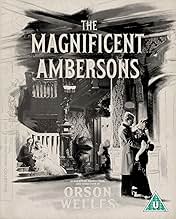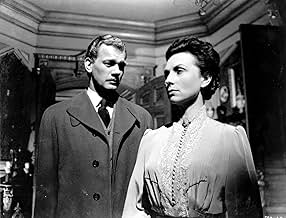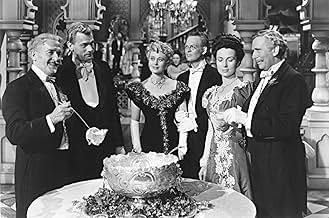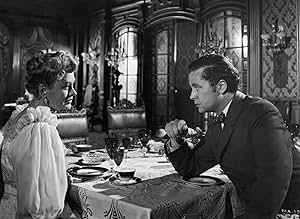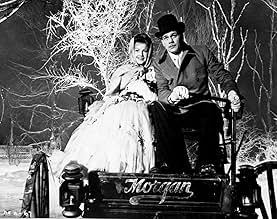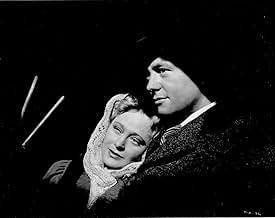VALUTAZIONE IMDb
7,6/10
28.009
LA TUA VALUTAZIONE
Il giovane erede viziato della decadente fortuna di Amberson si trova tra la madre vedova e l'uomo che ha sempre amato.Il giovane erede viziato della decadente fortuna di Amberson si trova tra la madre vedova e l'uomo che ha sempre amato.Il giovane erede viziato della decadente fortuna di Amberson si trova tra la madre vedova e l'uomo che ha sempre amato.
- Regia
- Sceneggiatura
- Star
- Candidato a 4 Oscar
- 8 vittorie e 4 candidature totali
Orson Welles
- Narrator
- (voce)
Edwin August
- Citizen
- (non citato nei titoli originali)
Georgia Backus
- Matron
- (non citato nei titoli originali)
Harry A. Bailey
- Citizen
- (non citato nei titoli originali)
Olive Ball
- Mary - Maid
- (non citato nei titoli originali)
Jack Baxley
- Reverend Smith
- (non citato nei titoli originali)
William Blees
- Young Man at Accident
- (non citato nei titoli originali)
Lyle Clement
- Citizen
- (non citato nei titoli originali)
Bobby Cooper
- George Minafer as a Boy
- (non citato nei titoli originali)
Don Dillaway
- Wilbur Minafer
- (non citato nei titoli originali)
Recensioni in evidenza
If you think Citizen Kane is wonderful, then, if you haven't already seen it, find a copy of "Ambersons" as soon as you can. To me, "Ambersons" surpasses "Kane" in complexity and perhaps richness of characters. The story of the long-term results of love deferred, unrequited love, and long-suffering love, are even more interesting with Welles' direction using overlaid dialogue and odd camera angles. My favorite part is when old Major Amberson speaks to the camera and it becomes apparent he's lost his mind. Chilling. The Ambersons captures a time more than a century ago in America when passions were suppressed and civility masked a boiling interior. This film was edited severely, I've read. This is another mystery, because the remaining footage is superb. We can only wonder what the original "Ambersons" might have been.
In this part of his career, Welles was interested in a few things. Thankfully we don't need the completed project to at least see what they were. And the understanding of them is probably more important than experiencing a coherent survey, as this was.
He's interested in surrounding a narrative, in giving it to us from all sides. He does this in narrative styles. In "Kane" he had narrators inside and outside the story, newsreels, newspapers, mysterious unfoldings, anticipated long events, and anticipated short ones.
He does it in the eye as well, having the camera surround and probe. And he plays these two off of each other, creating one sort of rhythm in the eye, another in the shifts of narrative, yet more in the physical movements on screen and finally in the emotional tides. Each of these is innovative, but together they become metacharacters in a sort of cinematic jazz. Oddly, the metaphor doesn't include the score itself for Welles, the one thing that has become a common skill today.
Now if we had the whole project, we'd get all the variations and pace in his jazz composition. As it is now, all we get are phrases, some broken a bit.
Just settle on one that you suppose hasn't been tampered with, say the sleigh/car encounter in the snow and revel in that for a few viewings, one after the other. It is absolutely amazing what interplay these elements have. And in this case we really do have some music: the players singing.
I suggest you play it again and again until you get it. Believe me, it will change your life when you can see this mind dance.
I would rather have the pieces because they have such a perfect logic and dance, you can imagine the rest. It baffles me that some people think Welles just innovated in camera angles and lighting. No, he created a whole higher level of drama.
Van Gogh painted a starry sky. It is, in effect two paintings in one. We have the beauty of the sky. And we have the beauty of the dabs and strokes of paint on the canvas, a sort of metapainting. The two dance around each other in a way that is magical. Welles did the same here and in "Kane." Afterward, he busted other walls.
Oh, and within the story, he uses automobiles as a metaphor to muse on the effect of this new metadrama compared to his home in the simpler theater. He wonders if we will be better off once what he does catches on.
Ted's Evaluation -- 3 of 3: Worth watching.
He's interested in surrounding a narrative, in giving it to us from all sides. He does this in narrative styles. In "Kane" he had narrators inside and outside the story, newsreels, newspapers, mysterious unfoldings, anticipated long events, and anticipated short ones.
He does it in the eye as well, having the camera surround and probe. And he plays these two off of each other, creating one sort of rhythm in the eye, another in the shifts of narrative, yet more in the physical movements on screen and finally in the emotional tides. Each of these is innovative, but together they become metacharacters in a sort of cinematic jazz. Oddly, the metaphor doesn't include the score itself for Welles, the one thing that has become a common skill today.
Now if we had the whole project, we'd get all the variations and pace in his jazz composition. As it is now, all we get are phrases, some broken a bit.
Just settle on one that you suppose hasn't been tampered with, say the sleigh/car encounter in the snow and revel in that for a few viewings, one after the other. It is absolutely amazing what interplay these elements have. And in this case we really do have some music: the players singing.
I suggest you play it again and again until you get it. Believe me, it will change your life when you can see this mind dance.
I would rather have the pieces because they have such a perfect logic and dance, you can imagine the rest. It baffles me that some people think Welles just innovated in camera angles and lighting. No, he created a whole higher level of drama.
Van Gogh painted a starry sky. It is, in effect two paintings in one. We have the beauty of the sky. And we have the beauty of the dabs and strokes of paint on the canvas, a sort of metapainting. The two dance around each other in a way that is magical. Welles did the same here and in "Kane." Afterward, he busted other walls.
Oh, and within the story, he uses automobiles as a metaphor to muse on the effect of this new metadrama compared to his home in the simpler theater. He wonders if we will be better off once what he does catches on.
Ted's Evaluation -- 3 of 3: Worth watching.
In many way this is a more brillant film than Kane. Kane was technically advanced, but somewhat distant. This is a much more intimate story. The romance between Eugene and Isabele is one of the most wonderful tales of unrequinted love ever put on film. I especially love the opening sequence which introduces us to the life -styles and habits of the Ambersons. I like the way Wells dwells on their array of evening wear, summer wear etc... He creates a great sense of calmness in a timeless era.
Agnes Moorehead is incredible in the role of Fanny. She has to scream for attension every time, like her character in the film. Tim Holt is great as a young Orson Wells (who was still young at the time). This spoilt brat was I'm sure very similar to Wells, or so he'd have us believe.
Obivously we all know what happened to the final cut. It was, and probably still is the greatest crime in cinema history. Its like painting a moustache on the Mona Lisa. At the end of this version when Eugene and Fanny are walking off into the sunset, and Eugene looks down at Fanny and says that he was "true to his own dear love" (meaning Fanny), its so absurd. Its the worst tacked-on ending I've ever seen. Eugene was never in love with Fanny, it was always Isabele, but Fanny loved Eugene. Hollywood made a joke of it. The Amberson family had finally got their comeuppance only for hollywood to decide it was too grim, and put on an ending that looked like ot came from another movie.
Initally it was such a piece of genius from Wells to film a story about the downfall of a family rather than their or rise to power, to tell the story in reverse.
Its so sad that we can never see the real version. I really feel that we are missing out on what could have been the greatest film ever made.
Agnes Moorehead is incredible in the role of Fanny. She has to scream for attension every time, like her character in the film. Tim Holt is great as a young Orson Wells (who was still young at the time). This spoilt brat was I'm sure very similar to Wells, or so he'd have us believe.
Obivously we all know what happened to the final cut. It was, and probably still is the greatest crime in cinema history. Its like painting a moustache on the Mona Lisa. At the end of this version when Eugene and Fanny are walking off into the sunset, and Eugene looks down at Fanny and says that he was "true to his own dear love" (meaning Fanny), its so absurd. Its the worst tacked-on ending I've ever seen. Eugene was never in love with Fanny, it was always Isabele, but Fanny loved Eugene. Hollywood made a joke of it. The Amberson family had finally got their comeuppance only for hollywood to decide it was too grim, and put on an ending that looked like ot came from another movie.
Initally it was such a piece of genius from Wells to film a story about the downfall of a family rather than their or rise to power, to tell the story in reverse.
Its so sad that we can never see the real version. I really feel that we are missing out on what could have been the greatest film ever made.
In a Mid Western town at the turn of the century, an ostentatious family lives in an ostentatious house and arrogantly considers itself superior to all the other folks. Isabelle Amberson is the doyenne of the family, and is courted by Eugene Morgan, a bright young engineer. Isabelle rejects Eugene because of an imagined slight, and marries the worthy if unspectacular Wilbur Minafer. This sets in train a tragedy of unrequited love as Eugene continues over the years to yearn for Isabelle, while Isabelle's plain sister Fanny carries a secret flame for Eugene. Isabelle's imperious son George grows up and, thwarted in his own love for Lucy Morgan, develops an intense antipathy towards Eugene, the ever-present guest at the Ambersons' dinner table.
Welles' affection for the Booth Tarkington novel which inspired this masterpiece is easy to understand. It is set in the snowbound countryside of the northern Mid West, the very place where Welles was born and raised, and the Ambersons are just the kind of upper middle class family from which Welles sprang. More than this, George Minafer IS Welles. Spoiled and deferred to as a child, George grows up knowing no bounds to his whimsy. The monster that he becomes is oddly attractive, partly because of his utter self-belief. Welles himself was such a man. He must surely have contemplated casting himself as George: Tim Holt, who actually appears in the role, resembles Welles uncannily, with his pudgy good looks and resonant baritone speaking voice. Welles had an inordinate fondness for strawberry shortcake, and so does George.
The sombre, brooding atmosphere of the film is reinforced by its symbolic scheme. It is a film of departures and sunderings, with characters forever disappearing on long vacations, dying or merely vanishing behind closing doors, as when Fanny scurries away, devastated by the courtship joke.
As with "Citizen Kane" in the previous year, the film's stylistic approach is to show groups of interlocutors as ensembles, without the camera moving in on the individual speaker. Some of the faces remain in shadow or are otherwise obscured. The viewer works out from the context whose words he is hearing. In "Kane", the device helped to show the many-faceted nature of a human life. Here, it underscores the centrality of the family. Each of the Ambersons is subordinate to the family itself, and the family is the continuum, the amber in which these characters are trapped. Another of the "Kane" themes is developed here - that wealth and status cannot protect anyone against unhappiness. Welles' fascination with mirror images, indulged here in the brief bathroom scene, was to emerge again in "The Lady From Shanghai".
George Minafer and his "grand, gloomy and peculiar way" is at the heart of this film. He clashes unpleasantly with Eugene for two important reasons - George, the classic 'mommy's boy', sees Isabelle's lover as a rival, and Eugene is despicable because he is 'in trade' - and therefore far too vulgar a man to be lounging around the Amberson drawing-room. George's excuse for the confrontation is his ostensible desire to protect his mother from scandal, but this convinces nobody. In the climactic scene where George refuses Eugene admission to the house, we see George first through etched glass, emphasising his emotional aloofness, and his essentially defensive posture. Mrs. Johnson addresses George as "Mr. Amberson", then corrects herself and gives him his actual title, "Mr. Minafer". The error is significant, because George is the archetypal Amberson - sneering, haughty and strangely dissatisfied with life. In the scene where George and Lucy sever their connection, George protests indignantly that the emotional stress is going to make him faint. He doesn't collapse, but Lucy does. This is typical of George - he is quick to make his own selfish position clear, but does not in fact share the emotional vulnerability of the rest of humanity. His arrogance seals him off. Lucy's discourse on indian names throws up 'Ven Do Nah', the legendary hero whose name means 'Rides Down Everything'. It is, of course, a veiled allusion to George. Perhaps 'They Couldn't Help It' is a reference to the decline of the Ambersons.
After the death of Wilbur, and a seemly period of mourning, Eugene tries again to court Isabelle. In this saga of lost love, Eugene's suffering is the most acute. When he writes to Isabelle after the rift with George, he pleads with her most touchingly not to "strike my life down twice". Eugene's forbearance and dignity are ever-present. Joseph Cotten plays him as a man who endures his misery with stoicism. His speech at the dinner table on the dubious benefits of the automobile is powerful, generous - and a classic Welles creation.
It is Lucy's fate to repeat her father's tragedy, growing old in the absence of love. Ann Baxter is charming as Lucy, and the ageing process is convincingly depicted. Her forced levity in the scene where George breaks with her is very moving.
Welles' record is unique: two years, two films, two masterpieces.
Welles' affection for the Booth Tarkington novel which inspired this masterpiece is easy to understand. It is set in the snowbound countryside of the northern Mid West, the very place where Welles was born and raised, and the Ambersons are just the kind of upper middle class family from which Welles sprang. More than this, George Minafer IS Welles. Spoiled and deferred to as a child, George grows up knowing no bounds to his whimsy. The monster that he becomes is oddly attractive, partly because of his utter self-belief. Welles himself was such a man. He must surely have contemplated casting himself as George: Tim Holt, who actually appears in the role, resembles Welles uncannily, with his pudgy good looks and resonant baritone speaking voice. Welles had an inordinate fondness for strawberry shortcake, and so does George.
The sombre, brooding atmosphere of the film is reinforced by its symbolic scheme. It is a film of departures and sunderings, with characters forever disappearing on long vacations, dying or merely vanishing behind closing doors, as when Fanny scurries away, devastated by the courtship joke.
As with "Citizen Kane" in the previous year, the film's stylistic approach is to show groups of interlocutors as ensembles, without the camera moving in on the individual speaker. Some of the faces remain in shadow or are otherwise obscured. The viewer works out from the context whose words he is hearing. In "Kane", the device helped to show the many-faceted nature of a human life. Here, it underscores the centrality of the family. Each of the Ambersons is subordinate to the family itself, and the family is the continuum, the amber in which these characters are trapped. Another of the "Kane" themes is developed here - that wealth and status cannot protect anyone against unhappiness. Welles' fascination with mirror images, indulged here in the brief bathroom scene, was to emerge again in "The Lady From Shanghai".
George Minafer and his "grand, gloomy and peculiar way" is at the heart of this film. He clashes unpleasantly with Eugene for two important reasons - George, the classic 'mommy's boy', sees Isabelle's lover as a rival, and Eugene is despicable because he is 'in trade' - and therefore far too vulgar a man to be lounging around the Amberson drawing-room. George's excuse for the confrontation is his ostensible desire to protect his mother from scandal, but this convinces nobody. In the climactic scene where George refuses Eugene admission to the house, we see George first through etched glass, emphasising his emotional aloofness, and his essentially defensive posture. Mrs. Johnson addresses George as "Mr. Amberson", then corrects herself and gives him his actual title, "Mr. Minafer". The error is significant, because George is the archetypal Amberson - sneering, haughty and strangely dissatisfied with life. In the scene where George and Lucy sever their connection, George protests indignantly that the emotional stress is going to make him faint. He doesn't collapse, but Lucy does. This is typical of George - he is quick to make his own selfish position clear, but does not in fact share the emotional vulnerability of the rest of humanity. His arrogance seals him off. Lucy's discourse on indian names throws up 'Ven Do Nah', the legendary hero whose name means 'Rides Down Everything'. It is, of course, a veiled allusion to George. Perhaps 'They Couldn't Help It' is a reference to the decline of the Ambersons.
After the death of Wilbur, and a seemly period of mourning, Eugene tries again to court Isabelle. In this saga of lost love, Eugene's suffering is the most acute. When he writes to Isabelle after the rift with George, he pleads with her most touchingly not to "strike my life down twice". Eugene's forbearance and dignity are ever-present. Joseph Cotten plays him as a man who endures his misery with stoicism. His speech at the dinner table on the dubious benefits of the automobile is powerful, generous - and a classic Welles creation.
It is Lucy's fate to repeat her father's tragedy, growing old in the absence of love. Ann Baxter is charming as Lucy, and the ageing process is convincingly depicted. Her forced levity in the scene where George breaks with her is very moving.
Welles' record is unique: two years, two films, two masterpieces.
The Ambersons are the wealthiest family in Indianapolis. Eugene Morgan (Joseph Cotten) and Isabel Amberson are in love but she marries the dull Wilbur Minafer instead. Their only child George grows up a spoiled arrogant brat. Everybody in town is looking forward to his comeuppance. George falls for Lucy Morgan who is the daughter of Eugene Morgan. Eugene is in the new automobile business which George ridicules and belittles at every chance. George ridicules everybody and their professions while having an aimless outlook himself. After Wilbur's death, Isabel and Eugene rekindle their romance and enrages the petty temper of little George. While the Morgans gain greater and greater success through their automobile, the fortunes of the Ambersons decline.
George is such an annoying petty character that it's hard to base the movie around him. He's really the villain in Eugene and Isabel's lives. Orson Welles is a magnificent filmmaker and everything looks terrific. It's just hard to care about this character. Like the rest of the town, I'm just waiting for his comeuppance and I don't like that feeling. I'd rather have his redemption where he learns generosity. At least, he gets to responsibility but that part is short and the movie rushes to its ending.
George is such an annoying petty character that it's hard to base the movie around him. He's really the villain in Eugene and Isabel's lives. Orson Welles is a magnificent filmmaker and everything looks terrific. It's just hard to care about this character. Like the rest of the town, I'm just waiting for his comeuppance and I don't like that feeling. I'd rather have his redemption where he learns generosity. At least, he gets to responsibility but that part is short and the movie rushes to its ending.
Lo sapevi?
- QuizOne of former silent star Dolores Costello's last roles. She was forced to retire from the film business as her face had become badly scarred by early film makeup, which was highly caustic.
- BlooperTowards the end of a long tracking shot with George and Lucy in a horse-drawn carriage, a portion of the rear end of a camera car and some sort of filmmaking equipment briefly enter the left side of frame.
- Curiosità sui creditiAll of the credits except the RKO logo, the film's title and the copyright notice are recited orally (by Orson Welles) at the end of the film, not written out onscreen. As Welles recites the names of the production crew, items are seen, such as a motion picture camera when he says "Director of Photography", a pair of hands turning knobs as he says the words "Sound Recording By", etc.
- Versioni alternativeFrom "Magnificent Obsession," a Vanity Fair article by David Kamp from April 2000: "On March 11, Robert Wise sent a 132-minute composite print (a print with picture and soundtrack synchronized) to Rio for Orson Welles to review. This is the version that scholars and Wellesophiles consider to be the 'real' Magnificent Ambersons. Curiously enough, the first blow against this version was dealt not by RKO but by Welles himself. Before he'd even received the composite print, he impulsively ordered Wise to cut 22 minutes from the middle of the film, mostly scenes concerning George Minafer's efforts to keep his mother and Eugene apart. Wise complied, and on March 17, 1942, The Magnificent Ambersons, in this form, had its first preview screening, in the Los Angeles suburb of Pomona. Sneak previews are a notoriously unreliable gauge of a film's worth and potential for success, and RKO did The Magnificent Ambersons a particular disservice by previewing it before an audience composed mostly of escapism-hungry teenagers, who had come to see the movie at the top of the bill, The Fleet's In, a feather-light wartime musical starring William Holden and Dorothy Lamour".
- ConnessioniEdited into Histoire(s) du cinéma: Une histoire seule (1989)
- Colonne sonoreThe Man Who Broke the Bank at Monte Carlo
(1892) (uncredited)
Music and Lyrics by Fred Gilbert
Sung a cappella by Joseph Cotten, Dolores Costello, Anne Baxter,
Tim Holt, Agnes Moorehead and Ray Collins
I più visti
Accedi per valutare e creare un elenco di titoli salvati per ottenere consigli personalizzati
- How long is The Magnificent Ambersons?Powered by Alexa
Dettagli
Botteghino
- Budget
- 850.000 USD (previsto)
- Tempo di esecuzione1 ora 28 minuti
- Colore
- Proporzioni
- 1.37 : 1
Contribuisci a questa pagina
Suggerisci una modifica o aggiungi i contenuti mancanti

Divario superiore
By what name was L'orgoglio degli Amberson (1942) officially released in India in English?
Rispondi

